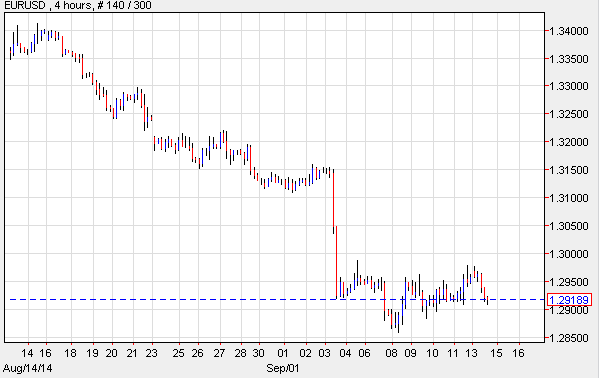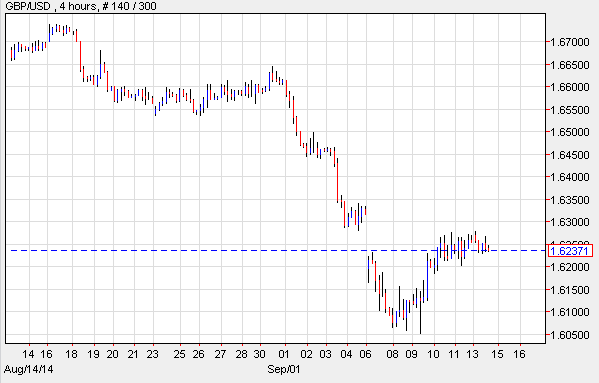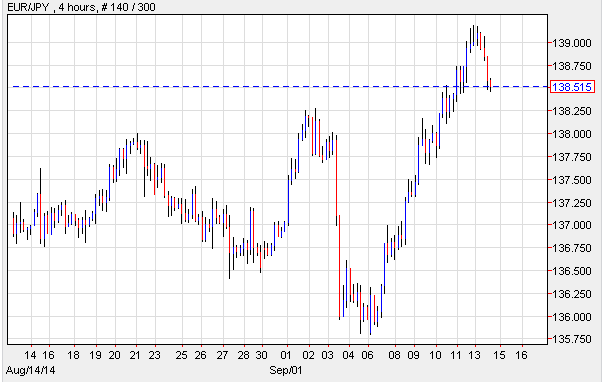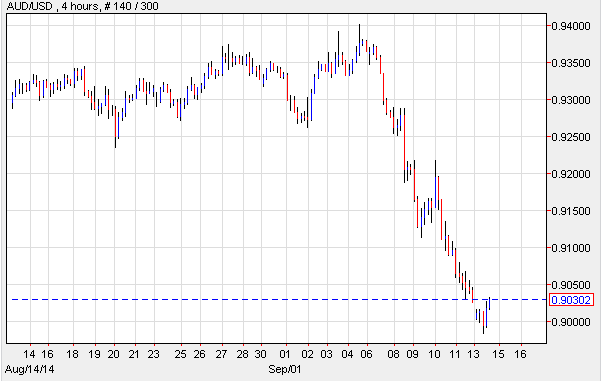The U.S. Dollar rallied against the majority of its Forex counterparts and remained strong as the Federal Reserve began its two-day policy meeting. Investors are anxiously awaiting to hear what the policy makers decide. They're expected to cut the monthly asset purchases by another $10 billion, and to conclude the quantitative easing program by next month. Speculators are also hoping that their statement reveals some type of time-line as to when the interest rates could begin to go up. Meanwhile, risk appetite ebbed in the market after China published soft economic data indicating a drop in Industrial Output, Retail Sales and Investments. Concerns over the Chinese economy prompted traders to seek safety. The U.S. Dollar slipped slightly following the announcement of mixed data. The Federal Reserve Bank of New York divulged that the Business Conditions Index rose to the highest level in five years, printing at 27.5 in September, after coming in at 14.7 in August. Economists had expected the index to only reach 16.0. Other publications confirmed that Industrial Production dipped 0.1 percent in August, missing forecasts for it to advance 0.3 percent. July's numbers were modified to show that output gained 0.2 percent, not the previously announced 0.4 percent.
Gold prices retreated from an eight-month low on Monday, and climbed for the first time in four days on the probability that a further decline could spur higher levels of purchases. Traders are bargain hunting, according to Forex experts. Gold for immediate delivery went up to $1,235.09 an ounce in the morning hours in London. And Contracts for delivery in December rose to $1,235.50 a troy ounce on the Comex Division of the New York Mercantile Exchange. The shiny metal rebounded, but it's expected to trend to the downside as the Dollar Index sustained a major surge, reaching a 14-month high on signs the U.S. economy is improving.
The Euro traded lower versus the greenback and the Yen at the start of the week following the announcement of Chinese macroeconomic fundamentals that sparked concerns in the markets. The recent data points to the fact that the second largest economy is struggling. Factory Output went up a mere 6.9 percent last month, while most economists predicted it would rise even more. The numbers showed that production went up by the least since spring of 2009. The Swiss Franc fell to the lowest price in one year versus its U.S. counterpart as the latter remained strong on speculation over the Fed's next move, and as Switzerland reported that Producer Price Inflation declined 0.2 percent in August, while analysts expected a hike of 0.2 percent. The British Pound continued to trade to the downside against the U.S. Dollar while the markets eyed the recent polls, which revealed that the outcome of the Referendum is too close to predict. Worries over the possibility that Scotland could vote to obtain independence from the U.K. weighed on the Sterling. Investors are also concerned about the fact that Scotland has not decided what currency it will utilize should it break from the Union.
The Yen continued to trade slightly above a six year low against the greenback. The U.S. Dollar's advance came to a halt while market traders wait to hear what the Federal Reserve has to say in terms of the future of monetary policy. The Japanese Yen remained to the downside days after the Bank of Japan's governor, Haruhiko Kuroda suggested that the bank could implement loose policies, or come up with other measures to ensure inflation reaches the 2 percent target.
Lastly, in the South Pacific, the Australian Dollar sustained a major fall after China reported a slowdown in its Factory Production. According to economists, this is the slowest China has been since the world's financial crisis. The risks are tremendous for the Aussie economy and it could push the currency further to the downside. New Zealand's Dollar traded near a seven-month low as all eyes remained on the Federal Reserve, and as China confirmed the decline in production. China is Australia's largest trade partner, and New Zealand's second largest.
EUR/USD- Anti-Euro Party In Merkel's Territory
The EUR/USD depreciated on Monday after China revealed that its economy is slowing down. Chinese releases denoted that Factory Production went up at the slowest since March of 2009, a factor that has impacted the markets. Risk appetite also declined as the U.S. military campaign against ISIS insurgents obtained the support from a number of countries after the news showed that the group killed a British aid worker. Meanwhile, the markets are keeping a close eye on the Federal Reserve's two-day meeting, and will wait to hear from the European Central Bank which will announce the outcome of the first TLTRO tender. In Germany, the anti-Euro Party claimed victory in two Eastern states, suggesting that Chancellor Angela Merkel could be facing challenges ahead.

GBP/USD- Sterling Continues To Drop
The GBP/USD continued to decline as the Scottish Referendum draws close. While the economic calendar shows a bounty of data due out this week out of the U.K., analysts believe that the polls and market sentiment will set the trend for the GBP/USD. After watching how Quebec tried to gain its independence from Canada, Mark Carney, the governor of the Bank of England now observes how the events in Scotland unfold. According to sources, Mr. Carney believes that he could be facing the biggest challenge of his career, the dissolution of the Union. On September 18, Scottish voters will decide their future. Mr. Carney has indicated that he has a plan that will help, should the Scotts gain their independence. He did not offer any details at this time, but he is trying to remain neutral.

EUR/JPY- Bank May Expand Stimulus In October
The EUR/JPY slumped on Monday, although the Yen remained to the downside on the possibility that the Bank of Japan could expand stimulus in October. The European Central Bank is pleased to see that the Euro remains weak, as it predicts this may help boost the region's economy. In Japan, after 18 months of following Prime Minister Shinzo Abe's economic program, the economy is not providing clear signs of progress. Analysts say that his tactics are not helping create wealth and are in fact destroying incentives for such. Meanwhile, Bank of Japan Governor, Haruhiko Kuroda told the Prime Minister that new measures or added stimulus is needed to ensure that inflation goes up and can reach the set target. Economic reports have shown that the percentage of Japanese products in overseas markets has declined while neighbors like South Korea are a threat to the Japanese auto and electronics industries. However, many analysts say that the "national consciousness" is solid and this is prompting Japanese households not to purchase products from abroad.

AUD/USD- Aussie Hits Lowest Rate This Year
The AUD/USD plunged and traded at the lowest level in 2014 as the price of iron ore continued to drop, and as the markets grew concerned about the slowdown of the Chinese economy. Chinese announcements showed that Retail Sales have fallen, and Industrial Production has not fared that well. The latest metrics on Production dipped to the lowest level since the peak of the world's financial crisis, and well below what analysts expected. Meanwhile, on the domestic front, Australia reported that New Vehicle Sales went down by 1.8 percent in August, after posting a decline of 1.3 percent in July.

Today's Outlook
Today's economic calendar shows that the Euro region will report on the Labor Cost Index and ZEW Economic Sentiment. The U.K. will publish data on CPI, Core CPI, PPI Input and Output, and the House Price Index. The U.S. will issue PPI, Core PPI, Manufacturing Sales and the Redbook. New Zealand will post the Current Account. And in Japan, the central bank's governor, Haruhiko Kuroda is scheduled to deliver a speech.
